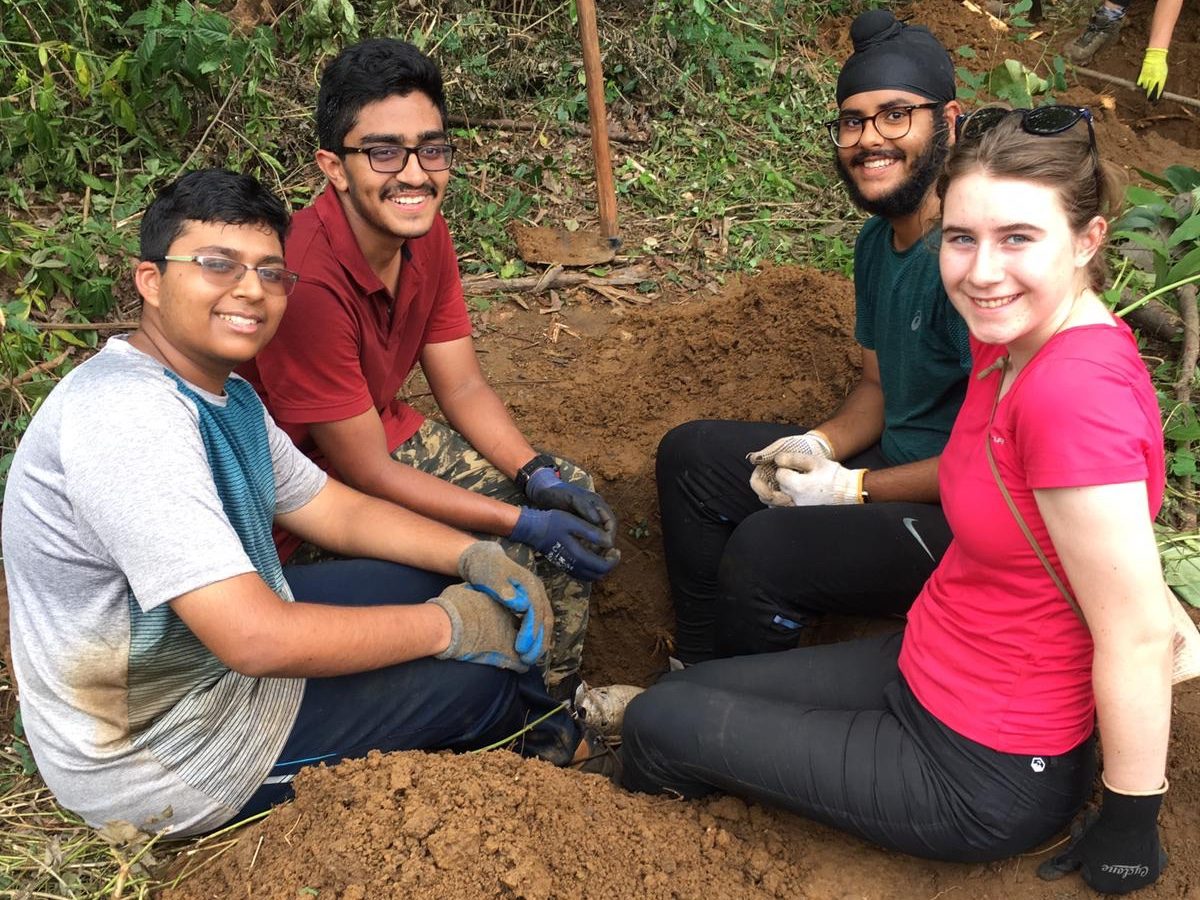RSIS Sri Lanka
Posted: 20 January 2019

Dates:
8th – 21st December 2018
Location:
Wasgamuwa, Sri Lanka
Building:
Building a community centre and planting citrus trees
About:
On Saturday 8th December 59 students from 22 Round Square schools representing all five RS regions arrived in Sri Lanka and launched into our December Round Square International Service projects.
“Our team was lovely, but as we worked together both on and off the site throughout the project we became so much more comfortable with one another allowing us to truly blossom to our full potential and become a really tight-knit group of people,” reflects Emily Anderson from Bunbury Cathedral Grammar School.
“I have made friends and memories that will stick with me for the rest of my life. I met a few of those people, ones that you just know are going to be a big part of your life,” agrees Hannah Cameron-Ross, Gordonstoun “I’m so happy to have met them.”
Our two project teams were led by Vicki from St Philip’s College, Australia and Kate from St Philip’s College. With them on the adult leadership team were Rod from Ivanhoe Grammar School, Greg from Schule Schloss Salem, Belinda from Bunbury Cathedral Grammar School, Gareth from YK Pao School, Brenda from Ballarat Grammar School, Justin from St Cyprian’s School, and Liz and Christophe from Latymer Upper School.
During their time on the project, the two teams worked closely with the local community and were able to see the direct impact of their work “I didn’t expect the local community to be so friendly and welcoming,” confesses Hannah Cameron-Ross from Gordonstoun “Although we didn’t speak the same language, the farming families that we were helping would always bring out snacks and sweet tea for the breaks we had during the working day. They had no fear about picking up unfamiliar tools and giving it a go to help us. They were always smiling, and it reminded me how close to home this project really was.”
“The best moment was seeing the happiness brought to the locals after the project was over and our satisfaction of providing them with a classroom,” agrees Krishni Jumani from Dhirubhani Ambani International School.
This project was unique as we had two teams working in parallel; a RSIS Big Build team of 45 students and our first ever RSIS Environmental team.
The RSIS Big Build team mainly worked on a construction project building a community centre in which the local villagers will come together to learn about elephant behaviour and gather for community events such as funeral services and festivities. The environmental team worked on Project Orange, an award-winning conservation programme that uses citrus crops to divert elephant herds on their migration, protecting the elephants and farmers, whilst creating an alternative cash crop.
Students took it in turns to lead the team during the project, taking responsibility for the organisation of the day, briefing their peers, giving an overview of safety and risk management and organising a student rota to help with different chores at camp.
“We were in an environment where we were constantly given opportunities to lead,” says Emily Anderson, Bunbury Cathedral Grammar School “Having so many others around you, often dependent on you to do your section of work or to support them when they are feeling tired, I believe we all continuously displayed the characteristic of leadership in one form or another.”
Students developed a sense of confidence in themselves and learned to think creatively and to lead the way in tackling problems while on the project site. Students learnt to recognise that different communication methods, styles and practices are appropriate to different nationalities and cultures and learnt to tailor their approach to suit.
The project had a strong sustainability focus, with students having the opportunity to learn about their impact on their surroundings. Many students returned home with a renewed commitment to sustainability.
“I think my attitude towards climate change and global warming has changed to become a more positive outlook,” says Emily Anderson from Bunbury Cathedral Grammar School “I feel inspired to create my own change and change in others which I now believe can and WILL have an impact on the future health of our planet.”
“The sustainability presentations had a BIG impact on our students,” says Belinda Walker, the Round Square Rep at Bunbury Cathedral Grammar School “We are lucky that all three of our students who took part in the project are Boarders and on the Student Exec. Since returning to school they have already actioned the following;
- No more plastic water bottles to be sold from our canteen or given out in boarding to students;
- Removal of plastic cutlery and plates from boarding take-away meals;
- The food scraps from all fundraising lunches are being collected and sent to the school compost in the primary garden and everything they buy to carry the food has to be compostable; and
- The student executive to fund a refrigerated water fountain that has a digital read out when students fill their reusable water bottle of how many single use water bottles refilling has saved.
This RSIS project has definitely inspired these three young leaders of tomorrow.”
Participating students have returned home with a greater understanding of themselves, their personality, values, attitudes, strengths and weaknesses, through personal discovery and finding that there is more in them than they may previously have thought. “I definitely felt as if I stretched myself in totally new ways,” agrees Hannah Cameron-Ross from Gordonstoun “I had no experience of working consistently in that climate and it was very hard work. I am definitely stronger for it. It was also a new experience to be living, eating and working with people I had no prior knowledge of. I found that in the end we had all become so close, it was very hard to leave and to go home again.”
“Overall, this has been one of the best experiences of my entire life,” says Patrick Reilly from Bunbury Cathedral Grammar School “and one I will never forget. The cultivation of physical and mental challenges, mixed with an opportunity for new friendships and a chance to make change socially, economically and environmentally for the better have all combined to contribute to this amazing multi- faceted experience.”
Round Square would like to say a big thank you to all the participating students for their tenacity, resolve and team work and for making both RSIS project in Sri Lanka an amazing experience. Their hard work and contribution will leave a lasting impression on the village, A representative from the community has said:
“We truly appreciate the participation of the Round Square students in our wildlife research, conservation and sustainable development programs in Sri Lanka this year. The 2018 Round Square program will result in numerous benefits to the local communities and the environment.
As a result of the of 2018 Round Square Program with the Sri Lanka Wildlife Conservation Society, one hundred villagers will receive 2000 orange plants which will help to increase their socioeconomic status by providing them with a crop that is not susceptible to elephant depredations and will give them a sustainable income over the long term.
In addition, the Round Square students will construct a much-needed classroom at the local village school. Due to space constraints some of the classes are held outdoors under trees, which is impossible during the monsoon rain season such as now.
So, the Round Square student’s contribution is timely and an incredible gift to all the present and future village children in the village of Pussellayaya in Wasgamuwa in the Central Province of Sri Lanka. The people of the village of Pussellayaya and the Sri Lanka Wildlife Conservation Society truly appreciate the contributions made by the 2018 Round Square Program and thank your organization most sincerely for these contributions.”
On behalf of our students, we would also like to thank the leaders, the local in-country support, our partner organisation and parents for their support in this amazing project.
